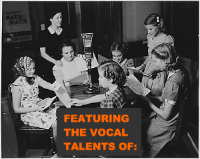
RECOVERING 1930s RADIO PEDAGOGIES
Jason Palmeri (Miami University)
Ben McCorkle (The Ohio State University at Marion)
While digital audio composing is often positioned as "experimental" or "new" within the field of composition (Comstock & Hocks, 2006; Dangler, McCorkle & Barrow, 2007; Jones, 2010; Selfe, 2009), our contemporary digital audio moment is not the first time that English teachers have become enraptured with new audio technologies. In this scholarly audio essay, we turn our ears back to the last great heyday of sonic writing in the discipline of English: the "golden age" of radio in the 1930s. Drawing primarily from a corpus of texts published in English Journal, we detail what today's compositionists can learn from recovering 1930s English teachers' experiments with radio production.
[Download Full MP3]
[Introduction] [Segments 1 & 2] [Segment 3] [Segment 4] [Conclusion]
Transcript
Tired of listening to us carry on about this and that? Why not read what we have to say instead (and you can listen along on this page too if you want). MORE
Appendix
Here's a handful of assignment ideas for working with audio production and reception, inspired by voices from the past. MORE
References
Here's a list of the English Journal sources mentioned in the sound essay (plus a few more citations thrown in for good measure). MORE
Production Notes
Find information on the background music, sound effects, and other details associated with this sound essay and web text. MORE

- cris cheek as Max Herzberg
- Katie Johnson as Ruth Batten
- Jonathan Bradshaw as Jay Newlin
- Catherine Tetz as Bernice Orndorff
- Katy Shay as Delight Phillips
- Morgan Leckie as Mildred Campbell
- John Silvestro as Keith Tyler
- Ashley Miller as Mildred Carson

This chapter is licensed under a Creative Commons Attribution-NonCommercial 4.0 International License.